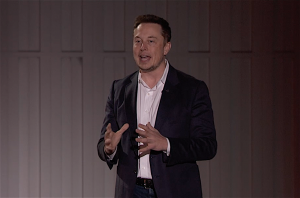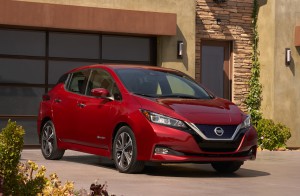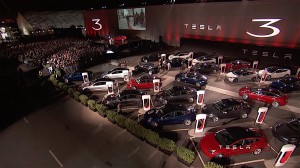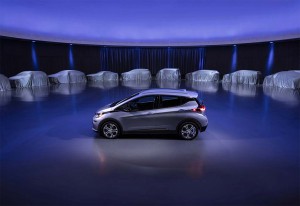
Tesla's CEO Elon Musk reported the company is having some production issues, or bottlenecks, with its new Model 3.
Tesla sales hit an all-time record during the third quarter, but what caught the eye of nervous investors was the severe shortfall in production of the company’s critical new Model 3 battery sedan.
All told, Tesla delivered 26,150 vehicles during the July to September quarter. But that included just 260 of the new Model 3 sedans, well below the 1,500 Tesla had originally forecast due to what the automaker described as “production bottlenecks.”
Investors responded to the news by driving down Tesla shares by as much as 2% Tuesday morning. It didn’t help that Tesla has gotten yet another poor review from Wall Street. Researchers at Cowen and Co. on Monday warned that Tesla stock is likely to “underperform.”
Tesla’s mixed results were announced hours after a senior General Motors executive revealed that the U.S. giant had laid out plans to go “all electric.” GM actually beat Tesla to market with the first mass-produced, mainstream-priced, long-range electric vehicle, the Chevrolet Bolt EV. And, according to global product development chief Mark Reuss, it will launch two more pure battery-electric vehicles, or BEVs, within 18 months, with a total of “at least 20” to be in its line-up by 2023.
(GM going all-electric, 20 new EVs planned by 2023. For the story, Click Here.)
GM’s announcement was just the latest from a major automaker shifting focus to electrified powertrains. Volkswagen, for one, has committed $20 billion to develop a range of hybrids, plug-ins and BEVs, and promises at least one battery-based option for every model in its line-up. Similar announcements have come from Aston Martin, BMW, Daimler AG and Volvo, and Toyota is expected to announce a broad electrification strategy in January.
Tesla now offers three different electric vehicles, including its big Model S sedan, the Model X SUV and the smaller Model 3, which went into production in July. That was hailed as a breakthrough for the California carmaker as Tesla had never hit a launch target before. It was nearly two years late to market with the Model X.
But, since the debut of the new sedan, there have been numerous leaks from inside Tesla indicating that Model 3 production has been hitting snags, in line with the “manufacturing hell” that CEO Elon Musk had warned about earlier this year. For its part, the automaker said in a statement Monday that “there are no fundamental issues,” but things clearly are not going as planned.
“Model 3 production was less than anticipated due to production bottlenecks,” Tesla noted in its statement. “Although the vast majority of manufacturing subsystems at both our California car plant and our Nevada Gigafactory are able to operate at high rate, a handful have taken longer to activate than expected.”
That all but ensures that Tesla won’t come close to producing 100,000 of the new battery models this year. What is less clear is whether it will be able to break those bottlenecks soon enough to hit Musk’s ambitious production goals for 2018. While Tesla has yet to build 100,000 vehicles in an entire year, the South African-born entrepreneur had forecast the number would hit 500,000 next year, about 80% of those BEVs being the Model 3.
(Click Here for more on a series of recent setbacks for Tesla.)
“Most auto launches have hiccups, and Tesla is no exception,” wrote Morgan Stanley analyst Adam Jonas in a new report.
Meanwhile, Gene Munster, of Loup Ventures, warned that “We believe Model 3 production will largely be a guessing game over the next few quarters, and could produce future disappointments.” Nonetheless, the analyst noted that Tesla still has 500,000 reservations for the new sedan “and we remain confident that Model 3’s value will stoke demand for the next several years.” Munster forecast a “breakout year” for the new sedan in 2019.
Tesla has long ridden a rollercoaster when it comes to the stock market. It recently nudged its $389 all-time high, but the stock has been running closer to $340 in recent days.

The second-generation Nissan Leaf offers more horsepower and nearly double the range of its predecessor — and more competition for the Model 3.
A big test may be looming. Tesla will reveal a prototype of the heavy duty semi truck it is developing later this month, and Musk is likely to discuss other new product plans. The company is known to be working on a downsized SUV, a new Roadster and an electric pickup.
Tesla also will announce third-quarter earnings in October and they are expected to be weak, in part, reflecting significant discounting on its older Models S and X, demand slipping in favor of the Model 3 in recent months. Some reports have suggested buyers are getting discounts of as much as $30,000 in terms of cost cuts and incentives.
(Tesla getting ready to reveal first battery-electric semi truck. Click Here for more.)
With its lower price and margins, the new Model 3 will need to generate significant increases in volume if Musk is to deliver on his promise of finally getting Tesla into the black. Even with its own accounting procedures, the company has so far earned money during only two quarters since going public.



Anyone can make cars, he’s busy with the BFR.